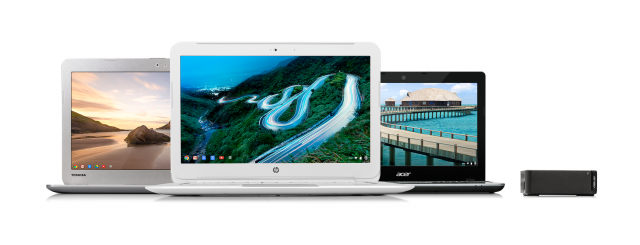Acer, HP and Toshiba will launch Haswell Chromebooks with all-day battery life
HP, Acer and Toshiba plan to launch Chromebooks in the fourth quarter with Intel’s “Haswell” processor inside, returning to what the Chromebook was originally known for: all-day battery life.
While the new Chromebooks are expected to be flagship products for their respective brands, don’t expect a repeat of the Chromebook Pixel; that product, which paired an Intel “Ivy Bridge” Core processor with an incredible 2560-by-1700 pixel touch display, was a “prototype” to show off the power of the Chromebook platform, Caesar Sengupta, director of product management at Google, told a small roundtable of reporters on Wednesday.
The $299.99 HP Chromebook 14, which HP executives showed off on Wednesday afternoon, is a 14-inch clamshell notebook that will be available in four colors. Also on display was an unnamed 11.6-inch Acer Chromebook. The Acer Chromebook was identified as the “ZHN C Test” on the back label. Toshiba executives didn’t attend.
 HP vice president Mike Nash said that the battery life of the Chromebook 14 comes in at about 10 hours. That’s good news for Chromebook buyers who are used to long battery life. The Chromebooks will offer 50 percent more battery life and be 15 percent faster than the Ivy Bridge models available today, Intel vice president of software and services Doug Fisher said during a keynote at the Intel Developer Forum in San Francisco.
HP vice president Mike Nash said that the battery life of the Chromebook 14 comes in at about 10 hours. That’s good news for Chromebook buyers who are used to long battery life. The Chromebooks will offer 50 percent more battery life and be 15 percent faster than the Ivy Bridge models available today, Intel vice president of software and services Doug Fisher said during a keynote at the Intel Developer Forum in San Francisco.
When Google launched the prototype Cr-48 Chromebook in the winter of 2010, the netbook was underpowered and little more than a Chrome browser plus a rudimentary file system. But the Chromebook platform was known for its constant connections—necessary when the netbook couldn’t do much, if anything, offline—as well as massive battery life on the order of 10 or 11 hours. That HP nc6200 laptop battery life decreased over subsequent iterations of the Chromebook, however, as Google’s partners increased the capabilities of the processor. The Pixel, as powerful as it was, had a battery life of roughly four hours, depending on how it was used.
Neither the OEMs nor Google disclosed the pricing for the new Chromebooks, which still face questions about packaged apps—and whether the Chrome OS-powered devices are in fact suitable to replace a PC. Google’s Sengupta reiterated the mantra of the Chromebook devices: that they’re constantly updated, so are always adding features. Still, the Chromebook’s selling points are cheap computing with all-day battery life. The new models will tick at least one of those boxes.
Did you enjoy this post? Why not leave a comment below and continue the conversation, or subscribe to my feed and get articles like this delivered automatically to your feed reader.

Comments
No comments yet.
Sorry, the comment form is closed at this time.